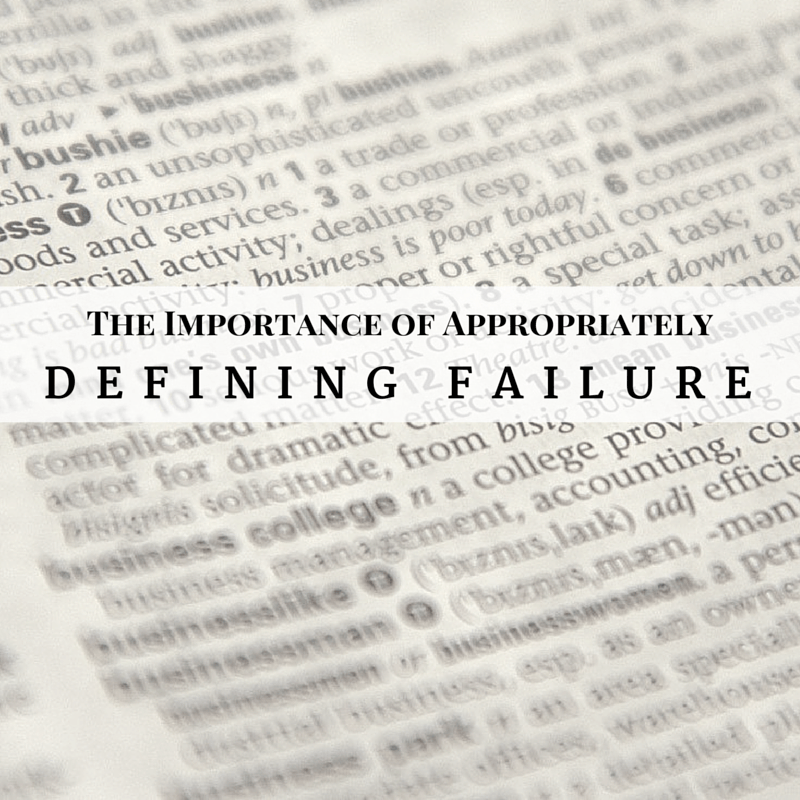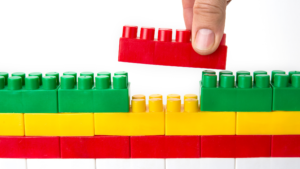
A few years ago, my mother-in-law and I had a debate about failure. I was a new mother at the time, and she had very particular thoughts about my role in my child’s education as it relates to that topic.
She is now a retired English teacher, but at the time she was still knee-deep in papers and dealing with all the fun of High School Juniors and Seniors…and their parents. She adamantly believes that children need to be taught how to fail – that too many parents are bailing their kids out or otherwise protecting them from the life lessons that can only be learned through being allowed to fail. She recounted endless stories of parents who refused to “let” any sort of failing grade stand in the way of their child’s future success.
While we were relatively aligned regarding what and how kids need to learn, it took a long, and sometimes heated discussion for us to figure that out. What I finally realized is that we were at odds on the definition of failure. As an English teacher, her idea of failure mostly related to grades on a paper or a test, the grade for a semester and any number of very tangible events. I have a very different definition.
Failure is the inability to learn from one’s mistakes.
We all make mistakes. It is impossible, and completely uninteresting, to try and live a life devoid of mistakes. Throughout our lives, it is only through mistakes that we learn and grow, pushing ourselves to be better or achieve more.
Inventors will make many mistakes in their endeavor to create something that never existed before. If they saw every mistake as a failure, they would never be successful. Instead, they see them as necessary learning opportunities, all moving them closer to the end result they want to achieve.
For my mother-in-law’s students, their mistakes were a result of not studying enough or not applying themselves sufficiently to get better grades. I see that as a mistake in judgement or a bad choice, but not failure.
I have made my fair share of mistakes. I lost a full ride to George Washington University from a culmination of mistakes – poor judgements that caught up with me at the end of my Freshman year. Some might consider that failure. I couldn’t see it that way, as I was not taught how to fail. It was never “okay” in our house. I was expected to try hard and do well. If I made mistakes, I was expected to stand back up, dust myself off, and try again.
If for one moment I had seen my Freshman year as a failure, I would have given up. Instead, I used it as fuel to drive myself to success. I learned from my mistakes, completed my undergrad and graduate degrees, and built a successful career…all from a starting point of a 1.67 GPA.
To me, failing means making the same mistake twice. It means using a mistake as an excuse to give up and not try again. Mistakes are the necessary price of growth and forward momentum. As human – imperfect – beings, mistakes are inevitable. Failure – by my definition – is not. It is a personal choice. One I refuse to make.
I am adamantly opposed to the notion that I need to teach my child how to fail, as my mother-in-law quickly found out. Instead, I am creating the same type of environment at home that I have at work for two decades.
I am a huge change advocate and am always doing my best to make things better. I challenge my team to do the same. There is inherent risk in change, in pushing yourself to do your best. All of us make mistakes, but it is how those mistakes are handled that make the difference between my team being willing to take a risk or just accepting status quo, keeping their heads down.
I provide an environment where it’s safe to make mistakes and talk about them. Tell me – I can help when things go wrong. All I ask is that they don’t hide them because then I can’t help. Why tell me if I’m going to see them, or their mistakes, as failure?
I have been heard to say, repeatedly “If you’re not making mistakes, you’re not trying hard enough.” And when mistakes happen, I defend my team, placing myself between them and any potential fallout. Why? Because they need to know they are safe.
Every time someone on my team makes a mistake, I debrief them on what went wrong and what could have been done differently. I don’t jump up and down. I don’t place blame. It’s “what happened?” and “what can we do about it?”
I guarantee they learn the lesson. Because I provide them a safe place to learn and help create the connection between their action (or inaction) and the end result, with suggestions on alternative choices they can make to affect a different outcome in the future. In twenty years, I’ve never had someone make the same mistake twice.
There are a lot of similarities between a child trying to grow into an adult and an adult learning and growing in their career. I cannot and should not prevent all mistakes from happening at home or at work.
What I can do is provide an environment where my son, or my team, can stretch their ability and safely make mistakes along the way, with compassionate education to help them learn from those mistakes, and the opportunity to try again with a new approach to achieve success. Teach them how to fail? Never.









2 Responses
This was a great read and very thought provoking . I agree with you on it is the manager’s job (duty) to create the environment were team members can make mistakes and know that they won’t be sacrificed or punished in some shape or form. This is a skill that is very much lacking in much of the corporate world. Where I disagree with you and agree with your mother-in-law, is that too aften kids are not taught how to handle failure.
You have elegantly defined your definition of failure, which I can accept, but I believe you have limited the breadth of what I understand is failure. As a former competitive athlete and coach, kids do experience failure. Placing second or placing last, losing the football game, etc. are all forms of failure. Bottom-line it is a failure to win and how kids learn to handle losing (failure) goes a long way to how they handle it in academics or life. What I was taught and strongly believe is that you walk up to the person that beat you, shake their hand and congratulate them then let them know you will be back. It is not an easy thing to do, believe me. But it is the determination to do it better the next time is the drive that I have seen lacking in many.
Kevin – Thanks for the feedback! I am working on handling the whole losing thing, particularly with a 4 year old that beats me regularly at Uno. I’m torn between pride and the need to win. At least he knows that when he does win, it’s on his own and not because Mom “let” him. He doesn’t have to like it, but I’m adamant that he learn that nothing is given in this life. You have to earn it.
When it comes to sports and games, I agree with learning how to be a graceful loser…and a gracious winner. Learning from your mistakes/losses – figuring out how to improve for the next time – is key to success. I think you, my mother-in-law, and I are all on the same page. It may seem like a fine line I’m walking on word choice, but as a parent, I want my son to learn that losing a game doesn’t equate to failure. I want him to see it as an opportunity to try harder next time. If he gives up? That will be an entirely different kind of conversation.
Thanks again and great to hear from you! I hope all is going well with your new endeavor!
Kristin